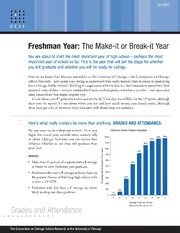
ERIC ED498356: Freshman Year: The Make-It or Break-It Year, Fall 2007. [Student Edition] PDF
Preview ERIC ED498356: Freshman Year: The Make-It or Break-It Year, Fall 2007. [Student Edition]
Fall 2007 CONSORTIUM ON CHICAGO SCHOOL RESEARCH AT THE UNIVERSITY OF CHICAGO c c s r Freshman Year: The Make-it or Break-it Year You are about to start the most important year of high school—perhaps the most important year of school so far. This is the year that will set the stage for whether you will graduate and whether you will be ready for college. How do we know this? Because researchers at the University of Chicago—the Consortium on Chicago School Research—have spent years trying to understand what really matters when it comes to graduating from Chicago Public Schools. Working in cooperation with the district, the Consortium researchers have analyzed years of data—surveys, standardized tests, student grades, attendance records—and uncovered some connections that might surprise you. It’s not about your 8th grade test scores, or even the ACT test that you will face in the 11th grade, although these tests do matter. It’s not about where you live and how much money your family earns, although those facts get a lot of attention when educators talk about drop-out statistics. Here’s what really matters far more than anything: Grades and attendance. No one wants to be a drop-out statistic. So as you Freshman Grades Predict Graduation begin this crucial year, consider what research tells 100% 97% 98% us about Chicago freshmen and the factors that 93% influence whether or not they will graduate four 90% 86% years later. s 80% ear 72% Y Grades our 70% F n • More than 95 percent of students with a B average ed i 60% 53% at u or better in their freshman year graduate. d 50% a Gr • Freshmen who earn a B average or better have an hat 40% e t 80-percent chance of finishing high school with ntag 30% 28% e at least a 3.0 GPA. erc P 20% • Freshmen with less than a C average are more 10% 6% likely to drop out than graduate. 1% 0 F D- D D+ C C+ B B+ A Average Freshman Grades Rounded to the nearest 0.5 Grades and Attendance Graduation rates are based on students entering high school in September 2001, followed until September 2005. The Consortium on Chicago school research at the University of Chicago absenCes Missing Classes Puts Graduation at Risk • Nearly 90 percent of freshmen who miss less than 100% a week of school per semester graduate, regardless 90% 87% of their 8th grade test scores. s 80% ar • Freshmen who miss more than two weeks of Ye ur 70% school flunk, on average, at least two classes—no Fo 63% n matter whether they arrive at high school with d i 60% e at top test scores or below-average scores. In fact, du 50% a freshmen who arrive with high test scores but hat Gr 40% 41% miss two weeks of school per semester are more e t g likely to fail a course than freshmen with low test enta 30% scores who miss just one week. Perc 20% 21% 9% 10% 5% 2% 1% 0% 0 0-4 5-9 10-14 15-19 20-24 25-29 30-34 35-39 40+ Days Absent per Semester Course cutting counted as partial days Graduation rates are based on students entering high school in September 2001, followed until September 2005. What does all this research mean for students? Essentially, that the freshman year is an important It sounds simple, but there is a lot of room for chance for a fresh start. Strong students can quickly improvement in these two areas. That’s because: fall off course if they start cutting classes and blow- • More than half of Chicago freshmen fail a course. ing off homework. And students who struggled in elementary school can turn things around if they • about 40 percent miss more than a month of school come to school every day and aim for a B average. in that first year (which includes class cutting). For Chicago students who want to graduate from • The average GPa is lower than a “C.” college—and 78 percent of seniors say they do—that B average in high school is what it’s going to take to But you don’t have to be one of these statistics. succeed in college. So…what can you do? 4 Get to school on time and don’t cut classes. You may 4 Make academics your top priority. This means trying think it doesn’t matter to blow off your first or hard on assignments even when they aren’t inter- last class of the day, but it does. Even occasional esting and choosing to study instead of socializing skipping leads to dramatically lower grades. And when there is a big test. Students with good study it sends the wrong message to teachers about your habits have higher GPAs and fail fewer courses desire to succeed. than classmates who don’t make homework a priority. 4 ask your teachers for help. Teachers should be helping struggling students, but sometimes it falls on you to ask for help. We know from our research that students do better in their courses when they trust their teachers and count on them for support. For more information, visit the Consortium’s website at ccsr.uchicago.edu
